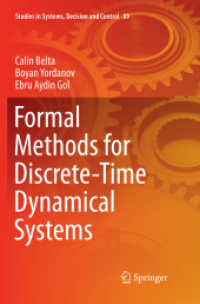Full Description
What do early childhood practitioners need to know about reflection and reflective practice?
Ongoing reforms in early childhood care and education social policy affect all aspects of young children's and their families' lives. Decisions are being undertaken at a rapid pace and there is a need for those working in the field of Early Years to consolidate and reflect on their knowledge and practice, building on what they already know.
This timely new book aims to support reflective practice for those working with young children in everyday work and in the wider political context, whatever their professional role and whatever level of qualification they hold. It takes a fresh look at a breadth of issues relating to early childhood care and education reflecting on policy, knowledge and practice.
Incorporating practical reflection activities, case studies, exemplar scenarios and questions in each chapter the book considers:
policy developments and how these have affected young children and their families
issues around socio-culturalism, language, ethnicity, disposition, gender, inclusion and socio-economics when working with families
learning through play and the notions of quality, observation and assessment and continuity
contemporary issues that practitioners and students on placement may encounter in their everyday work
deepening reflective thinking and practice through ongoing and continuing professional development.
With practical guidance to help the reader reflect on their own practice, this text offers invaluable support to early years practitioners looking to develop their career and achieving higher qualification at both undergraduate and at Master's level. The book is a must for students on early years courses including early childhood studies, initial teacher training and early years teacher status.
Contents
Part 1: Setting reflection firmly in early childhood care and education
Chapter 1: What is reflection and reflective practice?
Dr Avril Brock
Chapter 2: Why is reflection important for early childhood educators?
Dr Avril Brock
Chapter 3: Developing reflective writing
Dr Avril Brock
Chapter 4: Practitioners, professionalism and reflection on role
Dr Avril Brock
Chapter 5: What does professionalism mean for me?
Dr Avril Brock
Part 2: What is the knowledge base for early childhood educators?
Chapter 6: Reflecting on children, families and policy
Dr Avril Brock
Chapter 7: A children's centre manager's perspective
Jane Lees
Chapter 8: Reflecting on the role of graduates as pedagogical with children from birth to three
Mary Whalley
Chapter 9: Early years professionals' reflective practice from Kirklees' case studies
Rachael Singleton and Dr Avril Brock
Chapter 10: A Deeper Understanding of Play
Liz Chesworth
Focused reflection: What's Going On? The Challenge of Making Sense of Open Ended Play. Andy Burt
Chapter 11: Reflecting on school readiness
Dr Avril Brock
Chapter 12: Capable confident children: a reception class teacher's pedagogical reflections
Dr Avril Brock and Tina Thornton
Chapter 13: Quality is in the eye of the beholder: developing early years provision using child led quality indicators
Dr Jo Armistead
Part 3: Case studies of contemporary issues
Section 1: What's it like for a child?
Why my friends are so important? Dr Avril Brock
What's it like for a black child in the classroom? Gina Houston
Why are my stories so important to me? Dr Avril Brock
Adyta - The silent period, as experienced by young bilingual learners. Dr Caroline Bligh
What is it like for a child living with violence? Naomi Lewis
What is it like for a bereaved child? Avril Brock
Section 2: How can I develop my professional knowledge and practice?
How can I cater for children's individuality? Rachel Sparks Linfield
How do I develop children's understanding of the concept of time? Lyndsey Shipley
Communication using new technologies - the tip of the iceberg. Alix Coughlin
What should I do about young children's gun play? Rachel Marshall, Nicola Milton, Paula Render and Jennifer Smith
Reflecting on the process of learning how to teach reading using systematic synthetic phonics. Bev Keen
How do I observe and assess children's capabilities? Avril Brock
Section 3: Widening reflective professional knowledge: what do I need to know about this issue and why is it important?
Dealing with racist incidents. Gina Houston
How can an early years setting support the mental health of young children and why is this important? Lucy Akroyd
How to support asylum and refugee children face in early years education. Rebecca Wood
Does bullying really happen in early years? Melanie Henderson
Children with parents in prison. Avril Brock
Part 4: Continuing professional development and action research on reflective practice
Chapter 14:
Deepening reflection even further
Avril Brock
Chapter 15: On reflection: examining undergraduate reflective practice across two Higher Education (HE) sector endorsed Foundation Degrees (FD's) and BA (Hons) programmes within a Further Education (FE) provision.
Helen Rowe
Chapter 16: Does the use of reflective practice enhance early years foundation degree student's personal and professional development?
Nicola Firth
Appendices






